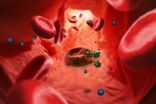(Press-News.org) TORONTO - Dec. 9, 2014 (Toronto) - Scientists at the Centre for Addiction and Mental Health (CAMH) have identified a novel drug target that could lead to the development of better antipsychotic medications.
Dr. Fang Liu, Senior Scientist in CAMH's Campbell Family Mental Health Research Institute and Professor in the Department of Psychiatry, University of Toronto, and her team published their results online in the journal Neuron.
Current treatment for patients with schizophrenia involves taking medications that block or interfere with the action of the neurotransmitter dopamine, which acts on dopamine D2 receptors in the brain. However, because this D2-blocking action may cause unwanted side-effects, such as slow gait, stiffness and tremor, Dr. Liu and her team looked for new ways to interfere with the action of D2 receptors, without causing these side-effects.
Dr. Liu and colleagues showed that the D2 receptor could combine with a protein called the Disrupted-In-Schizophrenia (DISC1) protein. Then, they showed that levels of this combined protein were higher in post-mortem brain tissues of deceased patients with schizophrenia, suggesting it was associated with the illness. Delving even further, the researchers identified the regions where the two proteins bound together.
With this information, they were able to generate a peptide to disrupt the binding of the two proteins, speculating that it may reduce symptoms. In animal models of schizophrenia, they were able to demonstrate that this disruption led to antipsychotic effects, comparable to commonly used antipsychotic medications, but without their side-effects.
"The most exciting aspect of our finding is not the antipsychotic effect of this peptide, which all current antipsychotics have, but rather the possibility of a lack of the side-effects in humans compared to current medications", says Dr. Liu. "We hope that it will lead to a better treatment for schizophrenia patients who experience side-effects from current medications." These side-effects discourage some patients from taking their medications, which impacts recovery.
Schizophrenia is a chronic, often severe and disabling mental illness that affects one percent of the general population.
"Our future steps are to determine how this discovery can be translated into a novel treatment for patients as soon as possible," says Dr. Liu. "We are optimistic that our findings will lead to new and better options for treatment for schizophrenia."
INFORMATION:
This study was funded by the Canadian Institutes of Health Research (CIHR).
Hummingbirds rely on their ability to hover in order to feed off the nectar of flowers.
It's an incredible feat of flying requiring mind boggling visual processing power, but two University of British Columbia researchers found a glitch in the system, something the tiny birds are powerless to control.
The researchers put hovering hummingbirds through a virtual reality experiment that showed the birds can't control their inflight response to some visual stimuli.
In a laboratory flight arena, hummingbirds hovered around a plastic feeder while images were projected on ...
As solar panels become less expensive and capable of generating more power, solar energy is becoming a more commercially viable alternative source of electricity. However, the photovoltaic cells now used to turn sunlight into electricity can only absorb and use a small fraction of that light, and that means a significant amount of solar energy goes untapped.
A new technology created by researchers from Caltech, and described in a paper published online in the October 30 issue of Science Express, represents a first step toward harnessing that lost energy.
Sunlight is ...
An international team of scientists has discovered the earliest known engravings from human ancestors on a 400,000 year-old fossilised shell from Java.
The discovery is the earliest known example of ancient humans deliberately creating pattern.
"It rewrites human history," said Dr Stephen Munro from School of Archaeology and Anthropology at The Australian National University (ANU).
"This is the first time we have found evidence for Homo erectus behaving this way," he said.
The newly discovered engravings resemble the previously oldest-known engravings, which are ...
Animals that regulate their body temperature through the external environment may be resilient to some climate change but not keep pace with rapid change leading to potentially disastrous outcomes for biodiversity.
A study by the University of Sydney and University of Queensland showed many animals can modify the function of their cells and organs to compensate for changes in the climate and have done so in the past, but the researchers warn that the current rate of climate change will outpace animals' capacity for compensation (or acclimation).
The research has just ...
SAN ANTONIO -- Use of anthracycline-based chemotherapy, a common treatment for breast cancer, has negligible cardiac toxicity in women whose tumors have BRCA1/2 mutations -- despite preclinical evidence that such treatment can damage the heart.
The findings, to be presented at the 2014 San Antonio Breast Cancer Symposium (SABCS), represent a unique effort between cardiologists and oncologists at Georgetown Lombardi Comprehensive Cancer Center and MedStar Heart & Vascular Institute in Washington to answer a vital clinical question.
"Our study was prompted by evidence from ...
SALT LAKE CITY, Utah, Dec. 9, 2014 - Myriad Genetics, Inc. (NASDAQ: MYGN) today announced results from a new study that demonstrated the ability of the myRisk™ Hereditary Cancer test to detect 105 percent more mutations in cancer causing genes than conventional BRCA testing alone. The Company also presented two key studies in triple negative breast cancer (TNBC) that show the myChoice™ HRD test accurately predicted response to platinum-based therapy in patients with early-stage TNBC and that the BRACAnalysis® molecular diagnostic test significantly predicted ...
BLOOMINGTON, Ind. -- It's widely known that the Earth's average temperature has been rising. But research by an Indiana University geographer and colleagues finds that spatial patterns of extreme temperature anomalies -- readings well above or below the mean -- are warming even faster than the overall average.
And trends in extreme heat and cold are important, said Scott M. Robeson, professor of geography in the College of Arts and Sciences at IU Bloomington. They have an outsized impact on water supplies, agricultural productivity and other factors related to human health ...
Off the West Coast of the United States, methane gas is trapped in frozen layers below the seafloor. New research from the University of Washington shows that water at intermediate depths is warming enough to cause these carbon deposits to melt, releasing methane into the sediments and surrounding water.
Researchers found that water off the coast of Washington is gradually warming at a depth of 500 meters, about a third of a mile down. That is the same depth where methane transforms from a solid to a gas. The research suggests that ocean warming could be triggering the ...
A new study from Karolinska Institutet in Sweden shows that long-term endurance training in a stable way alters the epigenetic pattern in the human skeletal muscle. The research team behind the study, which is being published in the journal Epigenetics, also found strong links between these altered epigenetic patterns and the activity in genes controlling improved metabolism and inflammation. The results may have future implications for prevention and treatment of heart disease, diabetes and obesity.
"It is well-established that being inactive is perilous, and that regular ...
Malaria parasites invade human red blood cells; they then disrupt them and infect others. Researchers at the University of Basel and the Swiss Tropical and Public Health Institute (Swiss TPH) have now developed so-called nanomimics of host cell membranes that trick the parasites. This could lead to novel treatment and vaccination strategies in the fight against malaria and other infectious diseases. Their research results have been published in the scientific journal ACS Nano.
For many infectious diseases no vaccine currently exists. In addition, resistance against ...




